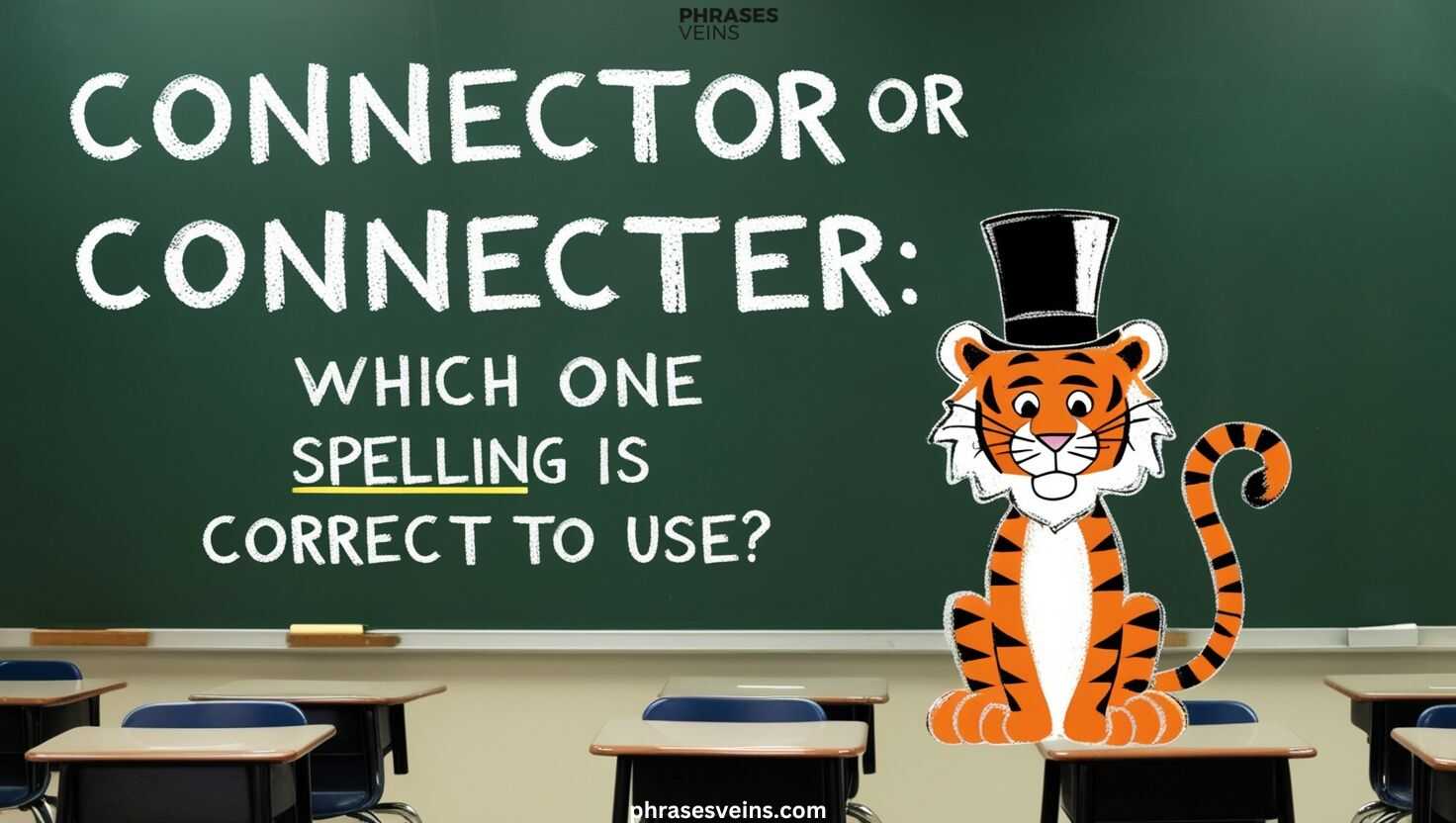The correct spelling of a word can often spark a debate, especially when two versions exist, like connector vs connecter. While these terms may seem similar, understanding their meaning of connector, usage, and history is essential for clarity in communication. This article delves into the spelling comparison, providing answers supported by modern English standards and dictionaries and style guides.
What Do Connector vs Connecter Mean?
Both “connector” and “connecter” refer to something or someone that connects. However, the meaning of connector is broader in modern usage. It applies to physical devices, grammar tools, and abstract concepts linking ideas or components.
| Word | Definition | Example |
|---|---|---|
| Connector | A device or tool that links or joins objects. | “This USB connector is broken.” |
| Connecter | Someone or something that connects. | “She’s a natural connecter of people.” |
While both terms share a root, their usage reflects modern spelling trends and language accuracy.
Define Connector
The connector definition is straightforward. It refers to an object or concept used to link things together. Common examples include electrical connectors, grammar linking words, or tools in construction.
Examples of connectors in context:
- USB connectors used in electronics.
- Linking words like “and” or “but” in grammar.
- Pipes with connectors in plumbing.
The role of connectors is vital in simplifying processes and improving communication across fields.
Define Connecter
“Connecter” is an outdated spelling of “connector.” It once referred to a person or thing connecting objects, similar to its modern counterpart. Today, it is rarely used in contemporary English.
- Example: “The connecter of the wires is faulty.”
- Modern usage: “The connector of the wires is faulty.”
This shift showcases the language trends favoring standardization in spelling.
Connector or Connecter : Which One Should Be Used?
The correct spelling debate ends with “connector” as the widely accepted version in modern grammar. Dictionaries and style guides consistently list “connector” as the preferred term.
- Connector: Common in both American and British English.
- Connecter: Rarely used and seen as a spelling variant.
To align with language norms, always choose “connector” for accuracy and professionalism.
Pronunciation of “Connector” and “Connecter”
Though similar, their pronunciation slightly varies:
- Connector: /kəˈnek.tər/
- Connecter: /kəˈnek.tər/ (less common).
The distinction lies not in sound but in spelling preferences shaped by modern usage of connector.
Difference Between American and British English
American and British English often differ in spelling conventions. However, “connector” remains the standard in both, making it the accurate wording regardless of region.
| Feature | American English | British English |
|---|---|---|
| Connector spelling | Connector | Connector |
| Connecter spelling | Rare | Rare |
Such consistency reflects current terminology and language accuracy.
READ MORE >>> Useing or Using – Which Form Is Correct? What’s the Difference?
How to Properly Use the Words in a Sentence
To maintain correct phrasing, use “connector” in professional or casual writing. While “connecter” may be recognized, it’s best avoided for consistency in communication.
How to Use “Connector” in a Sentence
- “The connector between these devices ensures stability.”
- “A strong connector improves grammar clarity.”
How to Use “Connecter” in a Sentence
- “She acted as the connecter of our team.”
- (Consider replacing with “connector” for modern English standards.)
Why and How “Connecter” Became Outdated?
The outdated spelling of “connecter” faded due to language trends. Over time, “connector” gained favor in contemporary usage, thanks to its alignment with other similar nouns.
- Example: “Advisor” vs. “Adviser” shows similar spelling shifts.
- Correct term: Use “connector” for clarity and professionalism.
Examples of Other Outdated Spellings
Many words have undergone linguistic variations. Here are examples:
| Outdated Spelling | Modern Spelling |
|---|---|
| Connecter | Connector |
| Adviser | Advisor |
| Calender | Calendar |
This evolution reflects language norms that prioritize simplicity.
Why and How “Connecter” Became Outdated?
The word connecter gradually became outdated due to changes in spelling conventions in English over time. Historically, both connector and connecter were used interchangeably. However, connector became the preferred correct spelling as modern English standards evolved. Dictionaries and style guides adopted connector as the proper term, leading to connector becoming the more common spelling today.
Linguistic shifts often cause certain forms to fall out of favor. In this case, the correct spelling debate reflects broader patterns in language simplification, as English tends to favor more straightforward forms. Over time, connecter was deemed redundant, while connector remained the go-to option for both written and spoken contexts.
Analogy with Similar Verbs
Other verbs with similar spelling variations follow the same pattern. For example:
| Verb | Outdated Spelling | Modern Spelling |
|---|---|---|
| Collect | Collecter | Collector |
| Direct | Directer | Director |
| Protect | Protecter | Protector |
These spelling variants show a trend where the modern spelling tends to drop an extra “e” at the end of the word. The simplification is not unique to connector, but rather a feature of contemporary English.
Analogy with Similar Verbs
Like connector vs connecter, verbs like “adviser vs advisor” or “theater vs theatre” showcase regional and spelling differences. These term variants highlight the shift toward unified modern spelling.
Origins of the Word “Connector”
The word connector traces its origins to the Latin verb “connectere,” which means “to bind together” or “to join.” This verb is a combination of “com-“ (together) and “nectere” (to tie or bind). Over time, this evolved into the modern English word connector.
The etymology of connector reflects its primary function: to serve as a tool or means of connection. The use of connector in English dates back to the 15th century, but it wasn’t until the 18th century that the word became widely used in both its literal and figurative senses. Initially, it referred to things like connecting words in grammar, and later it expanded to objects that physically join or link other objects, like wires or pipes.
Key Points in the Origins of Connector:
- Latin roots: Connectere (bind together).
- Used in various contexts: From grammar to physical objects.
- Evolution over time: The word took on broader meanings, including both abstract and tangible connections.
By the time connector became a standard term, it had already expanded to include various technical and everyday applications, making it indispensable in modern grammar and contemporary English.
Synonyms of the Word “Connector”
To expand your vocabulary, here are similar words for connector:
- Linker
- Joiner
- Coupler
- Intermediary
These connector alternatives help in crafting varied and engaging sentences.
Common Mistakes to Avoid
When using connector or discussing its usage, certain errors can undermine clarity. Below are key common mistakes to avoid, ensuring precise communication.
1. Incorrect Usage of Terminology
Using connecter instead of connector is a frequent error, especially in professional contexts.
- Incorrect: “The connecter in the device is faulty.”
- Correct: “The connector in the device is faulty.”
Stick to modern spelling standards for accuracy.
2. Linguistic Accuracy
Confusing connector with similar terms or misinterpreting its role of connectors can cause misunderstanding. Ensure proper use in grammar or technical contexts. For example:
- Linking words like “and” or “but” are grammar tools, not physical connectors.
3. Professionalism and Clarity
Inconsistent spelling in formal documents can reduce credibility. Always refer to trusted dictionaries and style guides to align with modern grammar practices.
4. Consistency in Communication
Switching between connector and connecter in a single piece of writing can confuse readers. Choose one spelling—preferably connector and maintain consistency.
5. Industry Standards and Expectations
Different fields, such as electronics or linguistics, have established norms for the proper spelling of connector. Adhering to these enhances professionalism and meets industry standards.
Frequently Asked Questions
What is a connecter?
The term connecter is an outdated form of the word connector. While connecter was once used interchangeably with connector, it has fallen out of favor due to modern spelling conventions and is no longer considered standard in contemporary English. Today, the correct spelling is connector, which refers to a device, word, or concept that links or joins things together.
Is the word then a connector?
Yes, the word connector is the correct term to use in modern English. Whether referring to a physical device (like an electrical connector) or a linguistic tool (like a connecting word), connector is the proper spelling. Connecter is now considered incorrect and outdated, as connector has become the accepted form in both formal and informal contexts.
Is neither a connector?
In modern English, neither connector nor connecter can be used to describe something that connects. The correct term is connector. If you’re referring to something that links, joins, or connects objects, people, or ideas, you must use connector. There’s no place for connecter in current usage.
What is a connector in IT terms?
In the context of information technology (IT), a connector is a physical or logical device used to link two systems, networks, or devices together. Examples include cables, plugs, ports, and software connectors that facilitate communication or data exchange between different systems or applications. The purpose of a connector in IT is to enable compatibility and interaction between different technological components.
Which is correct, connector or connecter?
Connector is the correct term. Connecter is considered an outdated spelling and should be avoided in modern writing. Whether you’re talking about grammar, technology, or physical links, always use connector.
What is being a connector?
Being a connector refers to the act of linking or joining different things together. In a physical sense, a connector may be a device like a plug or cable that physically joins two objects. In a social or business context, a connector could be a person who connects people or ideas, facilitating communication or collaboration. A connector plays a critical role in bringing things together, whether in language, technology, or human interaction.
Conclusion
In conclusion, the debate of Connector or Connecter boils down to the simple fact that connector is the correct and accepted spelling in modern English. While connecter was once used, it has become outdated and is no longer in common usage. Whether you’re referring to a physical device, a linguistic tool, or a role in business, always opt for connector to ensure accuracy and clarity in your communication. By following modern spelling conventions, you enhance the professionalism of your writing and maintain consistency in your language.

Welcome to PhrasesVeins, where Arabella Reed brings language to life. With a passion for grammar and phrases, Arabella offers unique insights to help you master language and enhance your expression. Whether you’re a language enthusiast or looking to improve your skills, Arabella’s work guides you through the beauty of words.

